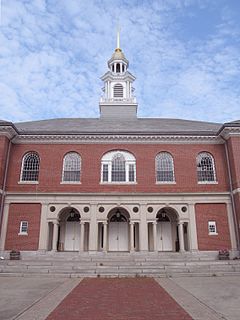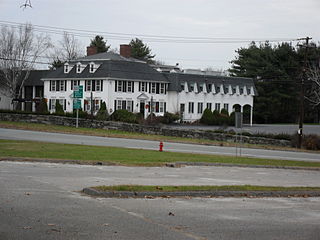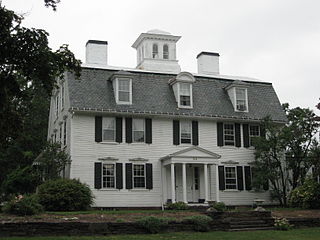
Billerica is a town in Middlesex County, Massachusetts, United States. The population was 42,119 according to the 2020 census. It takes its name from the town of Billericay in Essex, England.

The Middlesex Canal was a 27-mile (44-kilometer) barge canal connecting the Merrimack River with the port of Boston. When operational it was 30 feet wide, and 3 feet deep, with 20 locks, each 80 feet long and between 10 and 11 feet wide. It also had eight aqueducts.

The Fairbanks House in Dedham, Massachusetts is a historic house built ca. 1641, making it the oldest surviving timber-frame house in North America that has been verified by dendrochronology testing. Puritan settler Jonathan Fairbanks constructed the farm house for his wife Grace and their family. The house was occupied and then passed down through eight generations of the family until the early 20th century. Over several centuries the original portion was expanded as architectural styles changed and the family grew.

The Boardman House, also known as the Scotch-Boardman House or the Bennett-Boardman House, is a historic house located at 17 Howard Street, Saugus, Massachusetts. Built about 1692, it was designated a National Historic Landmark in 1961 because of the remarkable amount of original building material still present in the house. It has been owned by Historic New England since 1914, and is open to the public on select weekends between June and October.

North Billerica is an unincorporated village of the town of Billerica, Massachusetts, United States, one of the nine sections (hamlets) that make up the Town of Billerica. It is the home to Faulkner and Talbot mills and the North Billerica Train Depot. The Middlesex Canal was built through the village in 1783 and the Boston and Lowell Railroad was put through in the 1840s.

Schuyler Mansion is a historic house at 32 Catherine Street in Albany, New York, United States. The brick mansion is now a museum and an official National Historic Landmark. It was constructed from 1761 to 1765 for Philip Schuyler, later a general in the Continental Army and early U.S. Senator, who resided there from 1763 until his death in 1804. It was declared a National Historic Landmark on December 24, 1967. It is also a contributing property to the South End–Groesbeckville Historic District, listed on the National Register of Historic Places in 1984.

The Oldest House on Sunset Hill, also known as the Jethro Coffin House, was built in 1686 and is believed to be the oldest residence on Nantucket still on its original site. The island's English population at the time totaled several hundred, and the native Wampanoag outnumbered them by at least three to one.

The Hon. Bazaleel Taft House is a historic house at 240 South Main Street in Uxbridge, Massachusetts. The oldest portion of this now-large house was built c. 1780-90 by Bazaleel Taft, and is a fine regional example of late Georgian architecture. The house was adapted for use as a restaurant in the 1960s, which has since closed. The house was listed on the National Register of Historic Places in 1983.

The Wanton–Lyman–Hazard House is the oldest surviving house in Newport, Rhode Island, United States. Built c. 1697, it is also one of the oldest surviving houses in the state. It is located at the corner of Broadway and Stone Street, in the downtown section of the city in the Newport Historic District.

The Joseph Reynolds House is a historic house at 956 Hope Street in Bristol, Rhode Island, United States, built c. 1698–1700. The three-story wood-frame house is one of the oldest buildings in Bristol and the oldest known three-story building in Rhode Island. It exhibits distinctive, well-preserved First Period features not found in other houses, despite an extensive history of adaptive alterations. It is further significant for its use by the Marquis de Lafayette as headquarters during the American Revolutionary War. It was designated a National Historic Landmark in 1983.

The Fiske House is a historic house located at 1 Billerica Road in Chelmsford Center, Massachusetts.

The Woodrow Wilson Boyhood Home is a historic house museum at 419 7th Street in Augusta, Georgia. Built in 1859, it was a childhood home of Woodrow Wilson (1856–1924), the 28th president of the United States and proponent of the League of Nations. The house is owned and operated by Historic Augusta, Inc., and was designated a National Historic Landmark on October 6, 2008.

The Benjamin Cole House is a historic house in Swansea, Massachusetts, United States. Built in 1690, this house is the oldest documented building in Swansea.

The Manse is a historic church manse in Northampton, Massachusetts. With a construction history dating to 1744, it is in part a good example of vernacular mid-18th century architecture. It has also had a procession of locally notable owners and residents. The house was listed on the National Register of Historic Places in 1976.

The Bedford Center Historic District encompasses the historic heart of the town of Bedford, Massachusetts. It extends along Great Road between Bacon and Concord Roads, and includes primarily residential areas on adjacent side streets. The area includes the town's main civic buildings, its first cemetery, and a diverse array of residential architecture spanning more than two centuries. The district was listed on the National Register of Historic Places in 1977; its boundaries were adjusted in 2014 and its period of significance extended.

The Abraham Jaquith House, also known as Farley Garrison house, was a historic house in Billerica, Massachusetts. Built about 1725, it was one of the oldest surviving colonial era houses in the town, prior to its deconstruction in 2000. It was listed on the National Register of Historic Places in 1991.

The Jerathmell Bowers House is a historic house, built circa 1673, at 150 Wood Street in Lowell, Massachusetts. It is the oldest known home in Lowell. It was listed on the National Register of Historic Places in 1994.

Proprietary House in Perth Amboy, New Jersey, United States, is the only proprietary governor's mansion of the original Thirteen Colonies still standing. Overseen by architect and builder John Edward Pryor, construction began in 1762 and was completed in 1764. The Georgian style "mansion" was first occupied by Chief Justice Frederick Smyth by rent and approval of "The Proprietors" on April 10, 1766, to 1773. In May 1773, the mansion was repaired and fitted to be the residence of the royal governor of New Jersey, and leased by the proprietors as such.

The New Hempstead Presbyterian Church is located at the intersection of New Hempstead and Old Schoolhouse roads in New Hemsptead, New York, United States. It is a wood frame Federal style building from the 1820s, the third church on the site.

The Oliver House, also known as the Smith-Oliver House, is a historic house at 58 Oak Street in Wakefield, Massachusetts. Probably built in the late 18th century, this Federal period house is distinctive for its association with the now-suburban area's agrarian past, and as a two-family residence of the period, with two "Beverly jogs". The house was listed on the National Register of Historic Places in 2014.























